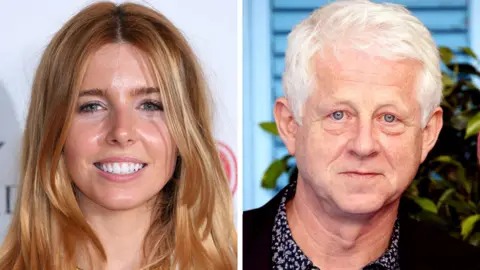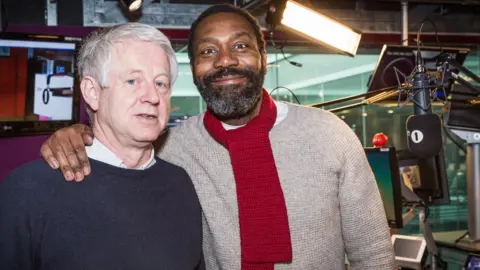Comic Relief to cut back on celebrity appeals after Stacey Dooley row
 Getty Images
Getty ImagesComic Relief is to send fewer celebrities abroad after criticism that stars like Stacey Dooley were going to Africa as "white saviours".
The charity's co-founder, screenwriter Richard Curtis, told MPs TV appeals "will be heading in the direction of not using" celebrities abroad.
He said they would be "very careful to give voices to people" who live there.
MP David Lammy, who had criticised the Dooley film, praised the plan to move away from "tired, harmful stereotypes".
Earlier this year, Comic Relief and Dooley - a documentary-maker and Strictly Come Dancing winner - were criticised after she travelled to Uganda to make an appeal film about the charity's work in the country.
Allow Instagram content?
Curtis, who wrote hit films including Four Weddings and a Funeral and Notting Hill, said: "We heard the criticism, we were doing stuff to address it, we're accelerating the way that we address it."
In 2017, Ed Sheeran's video from Liberia for Comic Relief was handed a "Rusty Radiator" award, given to the "most offensive and stereotypical fundraising video of the year".
Curtis told the House of Commons International Development Committee that this year's Comic Relief had included two films featuring UK celebrities in Africa - Dooley and the group of stars who climbed Mount Kilimanjaro.
"We are trying to do everything we can to raise the maximum amount of money for our projects internationally," he explained.
"But if it is felt that Comic Relief is so influential in terms of image that you start to send out the wrong image, and that people who live in this country with African backgrounds feel as though they're in some way demeaned or negatively affected by Comic Relief, then we really have to listen to that.
"What I'm searching for year by year is new ways of telling the stories. Traditionally, the sadder the film, the more money it makes, but I'm sure there must be a solution where you show such radiant joy and success that that would encourage you to give more money."

Asked by MPs how Comic Relief would operate in the future, he replied that the charity was "at a very interesting moment" in learning lessons from successful online fundraising campaigns.
"We're not strong on that yet," he said. "I imagine as we go into this new future, that will not be based on celebrities going abroad. I suspect we will start that new initiative not going that way.
"And then on the TV, I think we have to do what we think is best, and I think it will be heading in the direction of not using [celebrities abroad], and particularly being very careful to give voices to people abroad."
He said Comic Relief had not acted "robustly" to the criticism over the Dooley film because it was focused on raising money at the time.
In response, Labour MP Mr Lammy wrote on Twitter: "Looks like Comic Relief are finally ready to listen to hundreds of thousands of my constituents and others who support aid but want to move on from the tired, harmful stereotypes and tropes that surround it and prevent genuine equity and partnership."
Kelsey Nielsen of pressure group No White Saviours, who works in Uganda, said Comic Relief had pledged to make such changes in the past, and now needs to put them into practice.
It needs to stop "continuing this narrative that Africa is in need of the great white saviour and the great white influencers to come in," she told BBC News.
Charities shouldn't stop sending people to Africa, but should do it in a way that's not "manipulative or coercive", she added. "It's not about not helping and not caring, it's about the way it should be done.
"It's almost that idea that Africans should just be thankful for whatever help they get. That has a lot to do with the root of how we view each other. We would never tolerate that in our own countries, but because it's Africa we have a lower standard."

Follow us on Facebook, on Twitter @BBCNewsEnts, or on Instagram at bbcnewsents. If you have a story suggestion email [email protected].
